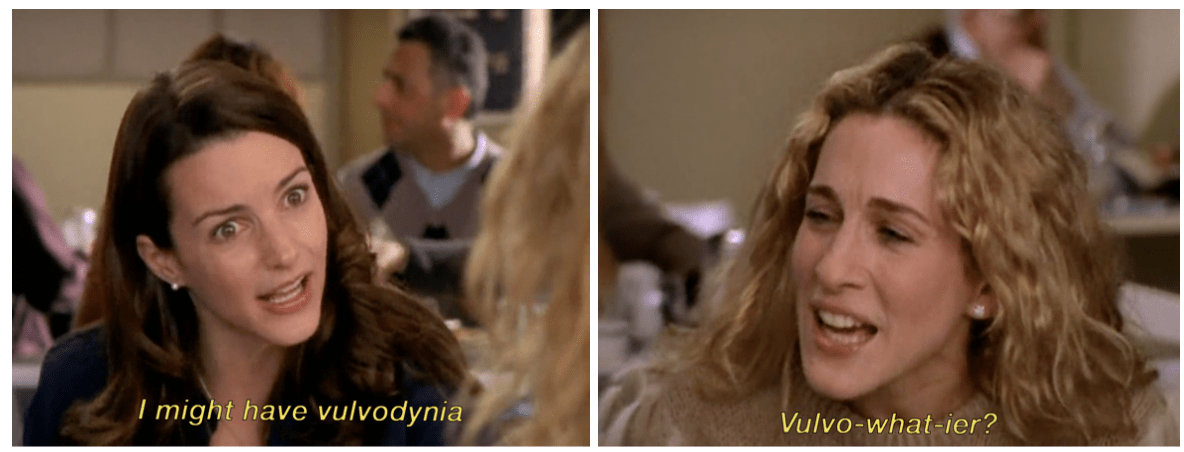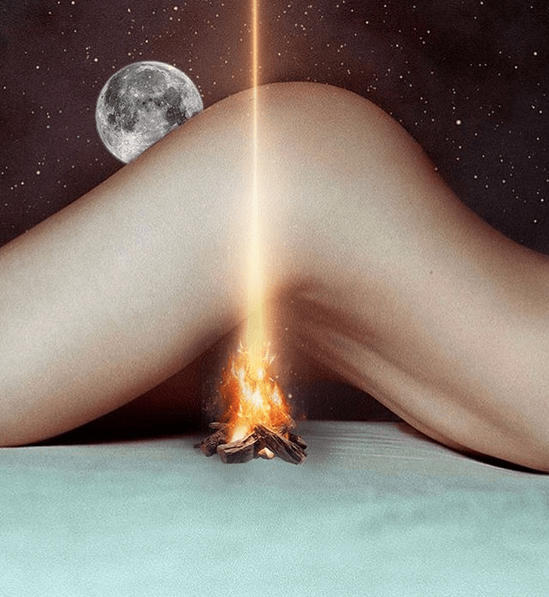Written by M. Bak
Art by Art Fucker
Ever since I was fifteen I hated my vagina- and not just because as a fifteen-year-old you think your vagina looks ugly and no one would ever wanna go down on that. I had reasons other than that, even though I did spend an awful lot of time googling whether or not the colour of my labia was normal. I hated my vagina because approximately four times a week it would hurt unbearably and I had no idea why.
I hated my vagina because approximately four times a week it would hurt unbearably and I had no idea why.
As a fifteen-year-old, I just assumed everyone felt this way all the time and no one talked about it because of #sexism. It wasn’t until I was standing in a home decor shop in a shopping centre next to my mum waiting for her to decide whether or not to buy another tablecloth that I started crying because my vagina was burning. My mum immediately sent me to see her gynaecologist, which was as useful as buying another floral tablecloth you have no matching plates for.
I saw many gynaecologists and did many swab tests for sexual diseases that I, as a fifteen-year-old virgin, did not have. The first gynaecologist told me that there was nothing wrong with me and that I was probably just stressed. The second one put me on antibiotics for no apparent reason and the last one told me the pain would go away once I start having sex. None of this worked, especially not pushing something into the place in which I was experiencing pain.
When you are young, you think doctors and adults know everything. Then you turn twenty and realise all the answers you need are on Reddit. I learned how to take care of my hormonal acne, how to get over someone I’d never dated and I also found out about vulvodynia through reading Reddit threads at 2:00 am in my bed. The first time I read about vulvodynia I cried. Partly because I was relieved that I wasn’t alone but also because most posts were about how hopeless treatment for it is.
Living with chronic pain is difficult as it is, but when you also struggle with mental health problems, it can be unbearable. As someone who feels anxious about everything all the time, I’m already constantly on the verge of just laying in bed all day, hating myself and staring at the ceiling. Most days I would be able to handle all these thoughts and feelings, but the second my vulvodynia flared up, it was over for me. I would lay in my bed and suffocate in self-hatred. Even though vulvodynia was just one thing I hated, it made everything else much worse.
Vulvodynia is a chronic illness that most commonly affects the skin around the opening of the vagina. It is different for everyone but for most people, it’s discomfort, pain and a burning sensation that can be triggered by exterior factors like touch, tight clothing or sitting for long periods of time or it can hurt for no apparent reason. There is no concrete explanation for it which makes the treatment difficult and because there is nothing visibly wrong with the vulva it’s hard to be diagnosed with it.
Vulvodynia is a chronic illness that most commonly affects the skin around the opening of the vagina. It is different for everyone but for most people, it’s discomfort, pain and a burning sensation that can be triggered by exterior factors like touch, tight clothing or sitting for long periods of time or it can hurt for no apparent reason.
After my self-diagnosis, it took another year for me to be diagnosed by a doctor and start treatment for it. I was prescribed a lidocaine gel which did help with instant relief of the pain but didn’t reduce it in the long run. After using the gel for four months, I was finally prescribed medication (Amitriptyline) for chronic nerve pain which reduced the pain drastically. Vulvodynia doesn’t have a huge effect on my life anymore, but I’m still grieving and experiencing the after-effects of my teenage years that were spent with an immense amount of pain.
Most people think the biggest struggle is sex, and it is a big part of it. Even after starting treatment, your brain associates your vulva with discomfort, and you have to teach it new associations which takes time. It isn’t just sex though, vulvodynia affects your work, your mental health and social life. When you’re out and having fun with friends until it suddenly flares up and you’re in pain, people will assume you are in a bad mood, because unfortunately you can’t just casually say: “I’m gonna go home now because my vagina is burning!”…or maybe you could if people knew what vulvodynia was.
As with a lot of studies about women’s health, there is not a lot of very reliable data about vulvodynia, but at least 2.5 million people with vaginas in the UK suffer from it and it’s mostly diagnosed in people between the ages of 16-25. For such a common disease, you rarely hear about it. The only time I ever heard anyone mention vulvodynia was in the 4th season of Sex and the City when Charlotte is diagnosed with it. The show handled it quite badly by just making a few jokes about it, but at least someone mentioned it!

With chronic pain comes a lot of anger and frustration. Like most teenagers, I always felt like everything was against me, which is a very hard thing to overcome with a chronic illness. I was constantly thinking: Why don’t I have good skin? Why don’t I have a fast metabolism? Why do I struggle with anxiety and depression? Why do I have vulvodynia and others don’t?
The answer is simple. Because some things in life suck and you are allowed to be angry about it! It’s unfair and sometimes being angry is a good thing. I’m angry at my vulvodynia a lot but I don’t sit in my room alone all angry by myself. I tell my friends how angry I am about my vulvodynia ruining my sex life and about how little money goes into research about women’s health. I talk to my sister about how we hate our dad for inheriting his acne and I eat a pack of crisps and complain about gaining weight easily and then suddenly I just feel a bit less angry.
About the Author
M. Bak is a filmmaker and writer based in London.
Follow on IG: @melbakir | Follow on Twitter: @melisabakir_

